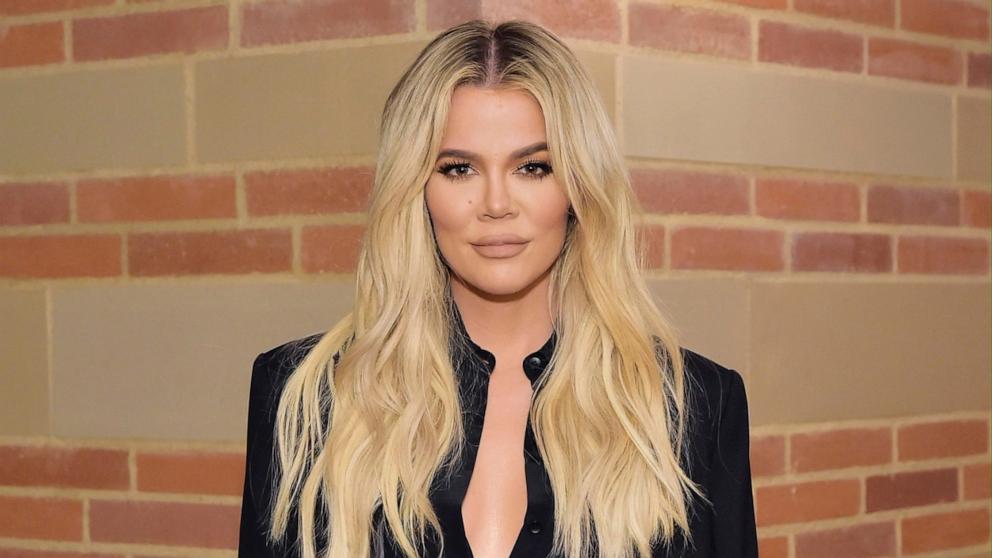
Khloé Kardashian is opening up about her weight journey, including how she used to turn to food to cope with her emotions.
Kardashian, 39, shared in a new interview that during her years of struggling with her weight, she was a self-described emotional eater.
"I used to be a major emotional eater, for sure," Kardashian said on the May 7th, episode of SHE MD, a podcast co-hosted by her own doctor, Dr. Thaïs Aliabadi. "I would feel so good eating and then so bad after. And then I would cry, and probably do it again because I was sad so I needed the ice cream again. It was this crazy repeat cycle."
The reality TV star and Good American founder described herself as being "overweight" for much of her life and said she always struggled with food more than exercise.
"I used to be on, not necessarily a diet, I would make lifestyle changes," she said. “I would, let’s say, cut out all sodas. Little by little, I would cut things out. I would do that for a week and then cut out one other thing. I did every diet under the sun when I was younger.”
As she got older, Kardashian said she began to focus on the mind-body connection and worked to "retrain" her thinking around food just as much as she worked on training her body.
"It's retraining your brain. If your brain isn't trained with your body, then it doesn't matter," she said, adding, "I gave myself a lot of patience and I just took my time. I wasn't like, 'Tomorrow is day one, six days a week and I'm cutting out all sugar.' It's so extreme. It's not sustainable."
Kardashian, a mom of two, said she has worked "really hard" to get to where she is now.
After giving birth to her daughter, True, six years ago, Kardashian said she was proud of herself for being able to lose her pregnancy weight in a healthy and sustainable way.
"Because I had all the tools in my toolbox, I knew what to do," she said, adding, "I was so proud of myself."
Emotional eating is when a person consumes food in response to an emotion or feeling, according to Samantha Dieras, a registered dietitian and director of Ambulatory Nutrition Services at Mount Sinai Hospital in New York City.
"If someone is stressed, if they’re angry, depressed, hurt, if they have a trigger to something that is going onto their life, if it’s a certain type of day and they haven’t eaten or prepared, that may trigger emotional eating," Dieras told "Good Morning America." "Because it’s kind of an automatic response, people may not know that they’re doing it."
Emotional eating is a behavior that can affect anyone at any time, according to Dieras.
The behavior is not classified as an eating disorder but could lead to binge eating if not properly managed.
MORE: Parents encouraging teens to diet can cause higher risk of obesity as adult"It really takes someone to sit back, observe their behavior, observe their emotion to really pin down that that's what's happening to be able to take a step to make changes," Dieras said of identifying emotional eating. "But absolutely there is help."
Dr. Jennifer Ashton, ABC News chief medical correspondent and a board-certified OBGYN and obesity medicine physician, said symptoms of emotional eating include only craving certain foods when upset or tired or experiencing another emotion, or feeling shame or guilt around eating.
"This is a very, very common thing," Ashton said of emotional eating on "GMA3." "I think the first step is observing it, recognizing it and then trying to modify it without judgment, being patient with yourself and kind with yourself."
People struggling with emotional eating should seek the help of a mental health professional, according to Dieras, who said a dietitian may also be a secondary resource for support.
Dieras said ways to cope with emotional eating on your own include trying different stress management techniques such as meditation, journaling and physical exercise.
MORE: Khloé Kardashian explains why it took 8 months to name sonShe said making social connections can also help to be able to express emotions to a person instead of turning to food.
"There are a lot of different ways to help in the in the moment and it's about finding what works for you as an individual," Dieras said, adding that coping with emotional eating can often be a lifelong journey. "What works for you today may not work for you tomorrow and different stressors are going to come into your life at different times."
Dieras also echoed Ashton and said one of the most important things in coping with emotional eating is to be patient with yourself.
"It's very difficult to manage the emotions in that moment, but try to see it more as acknowledging what happened and using it as an opportunity to do different next time and help yourself get out of the cycle as opposed to shaming yourself," Dieras said, adding, "If a pattern develops, help yourself to get out of it again, or even just acknowledge it's happening and say, 'When I'm ready, I will try again.'"
She continued, "Just try to be aware and be kind to yourself and give yourself grace."
If you or someone you know is battling an eating disorder, contact the National Eating Disorders Association (NEDA) at 1-800-931-2237 or NationalEatingDisorders.org.